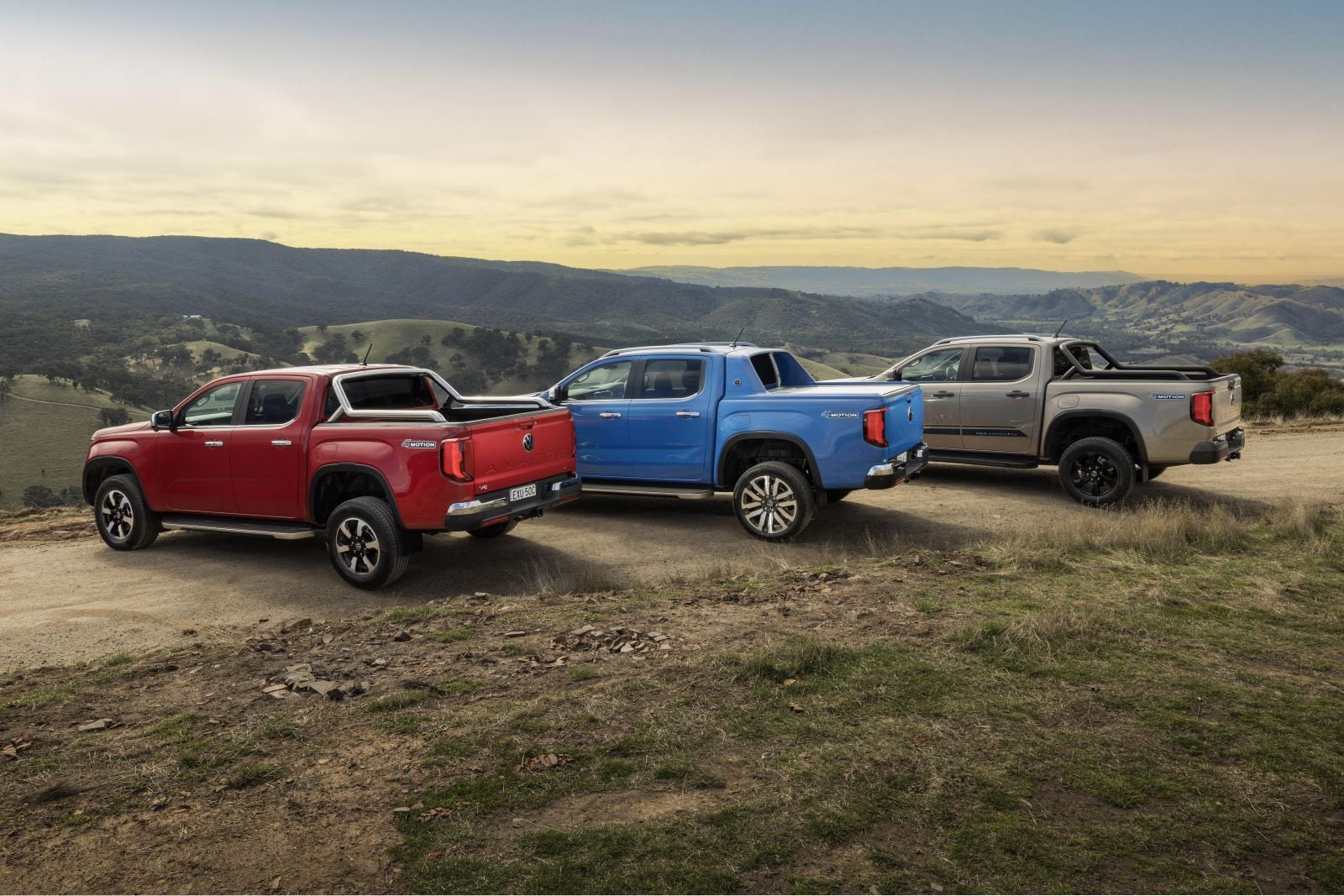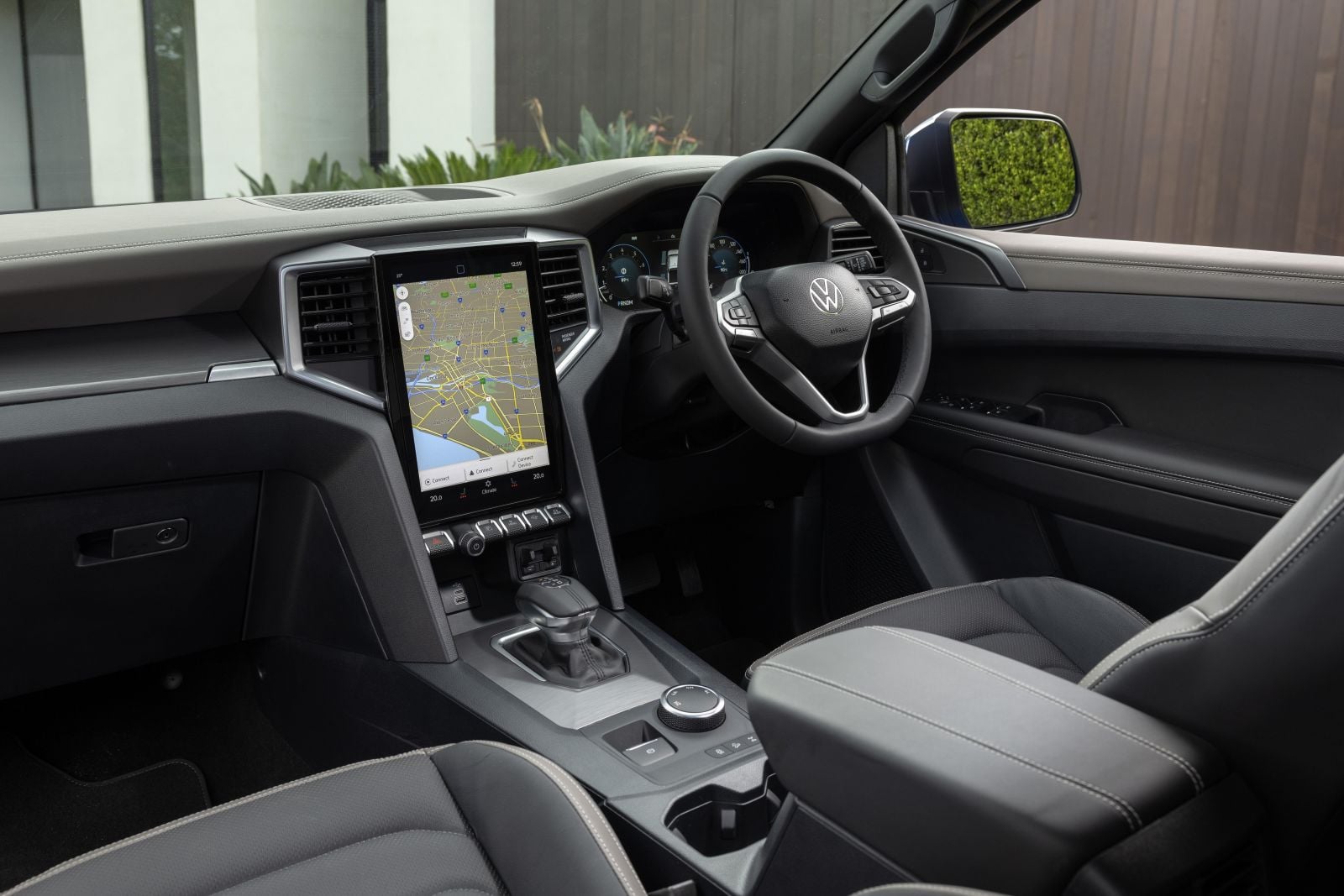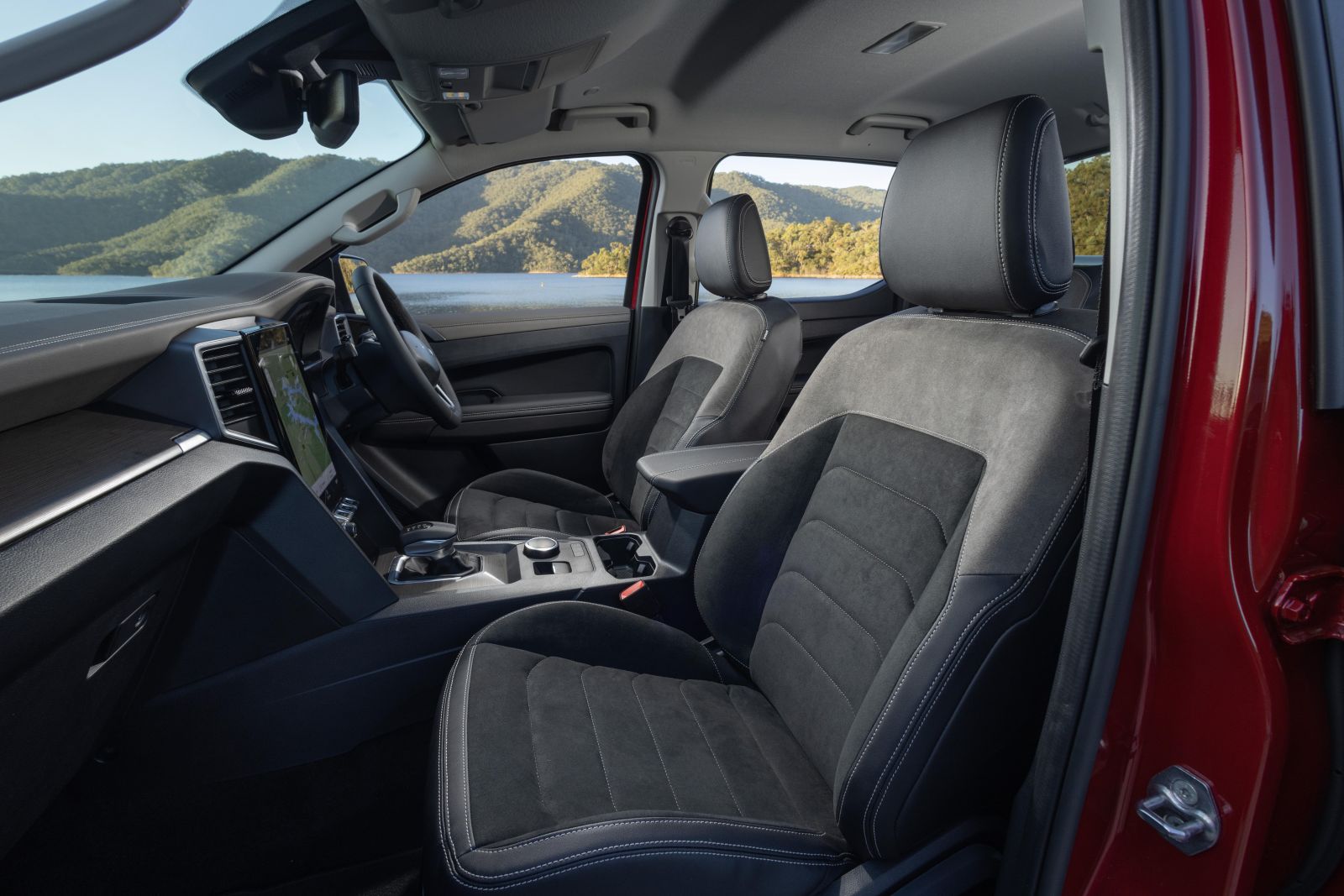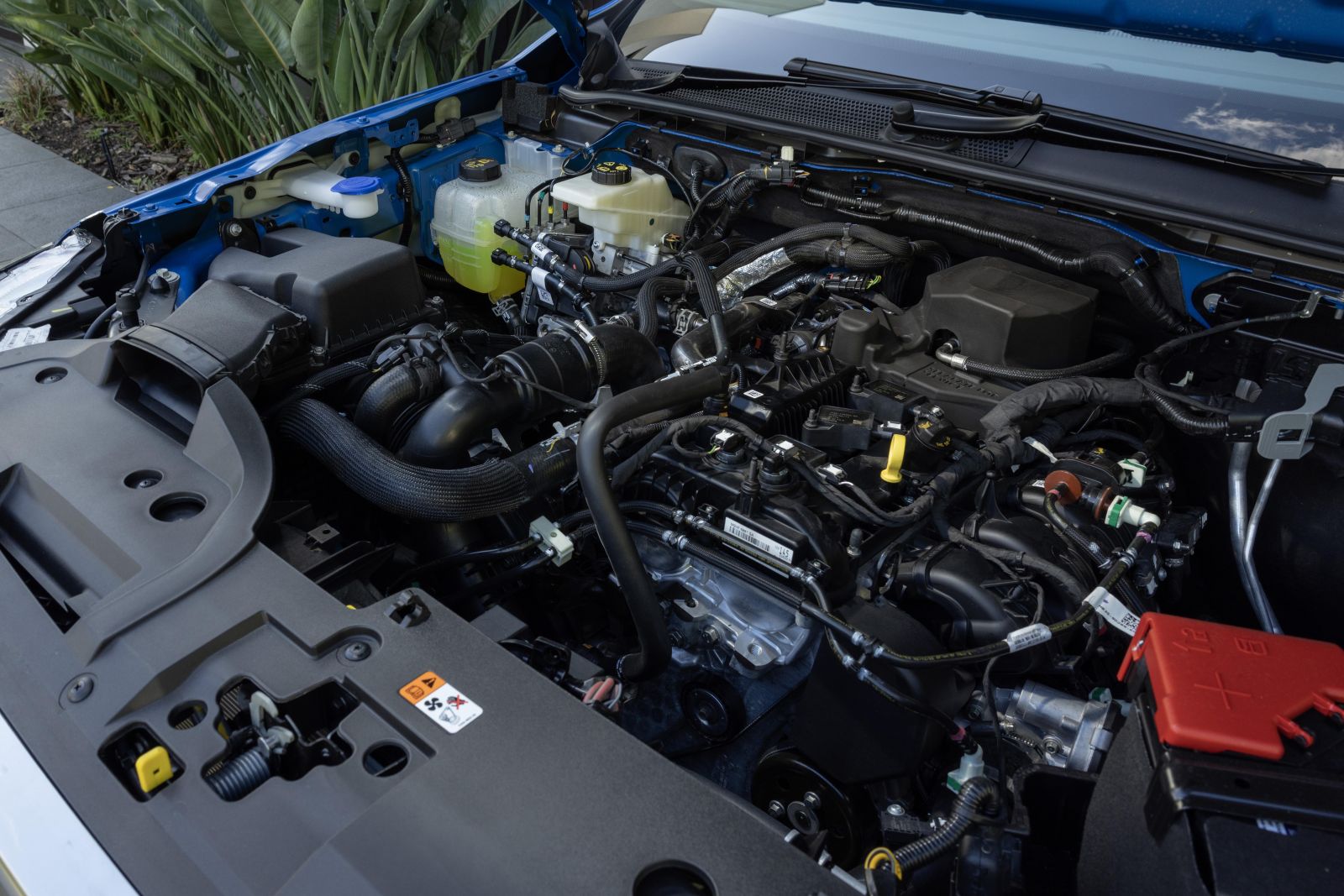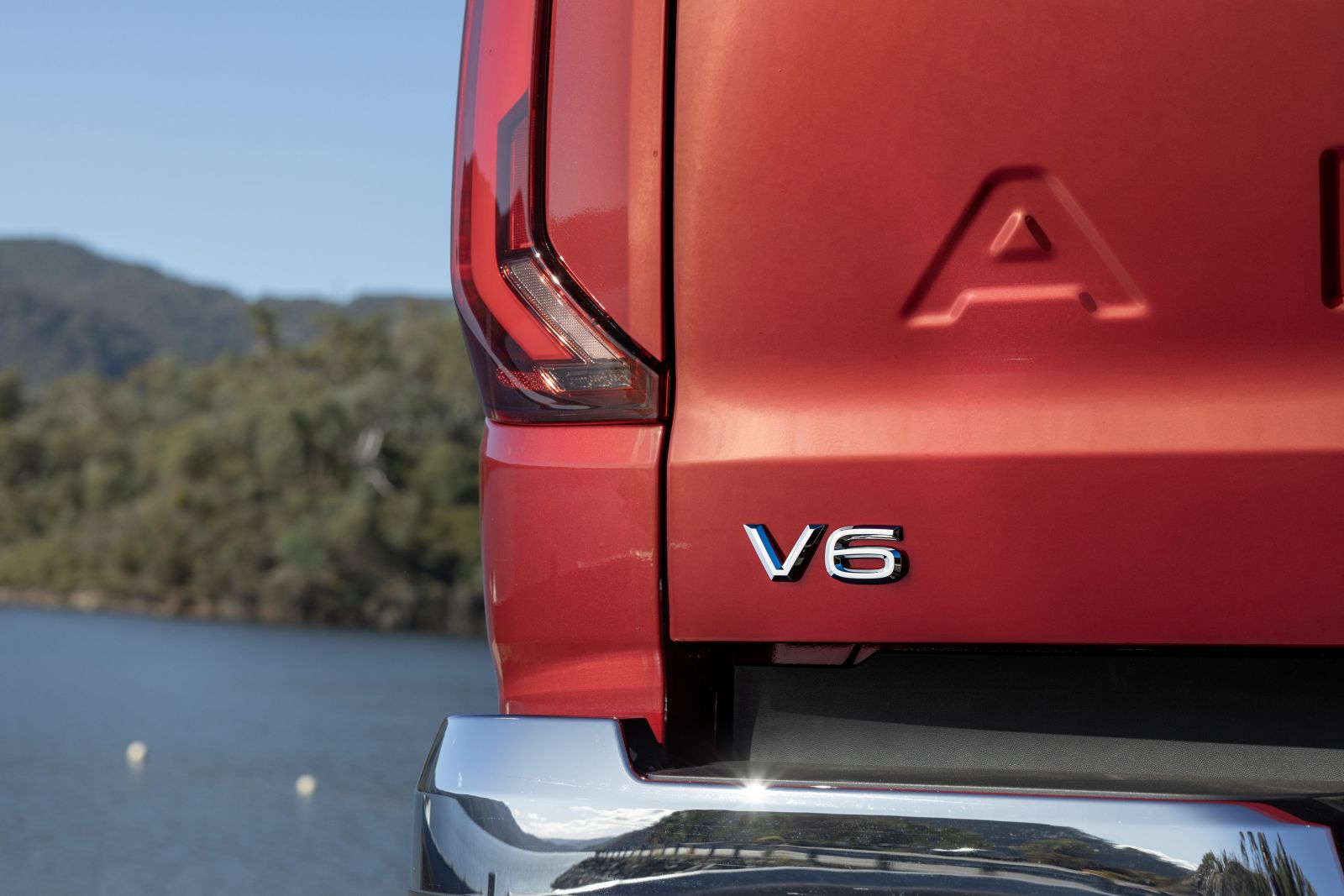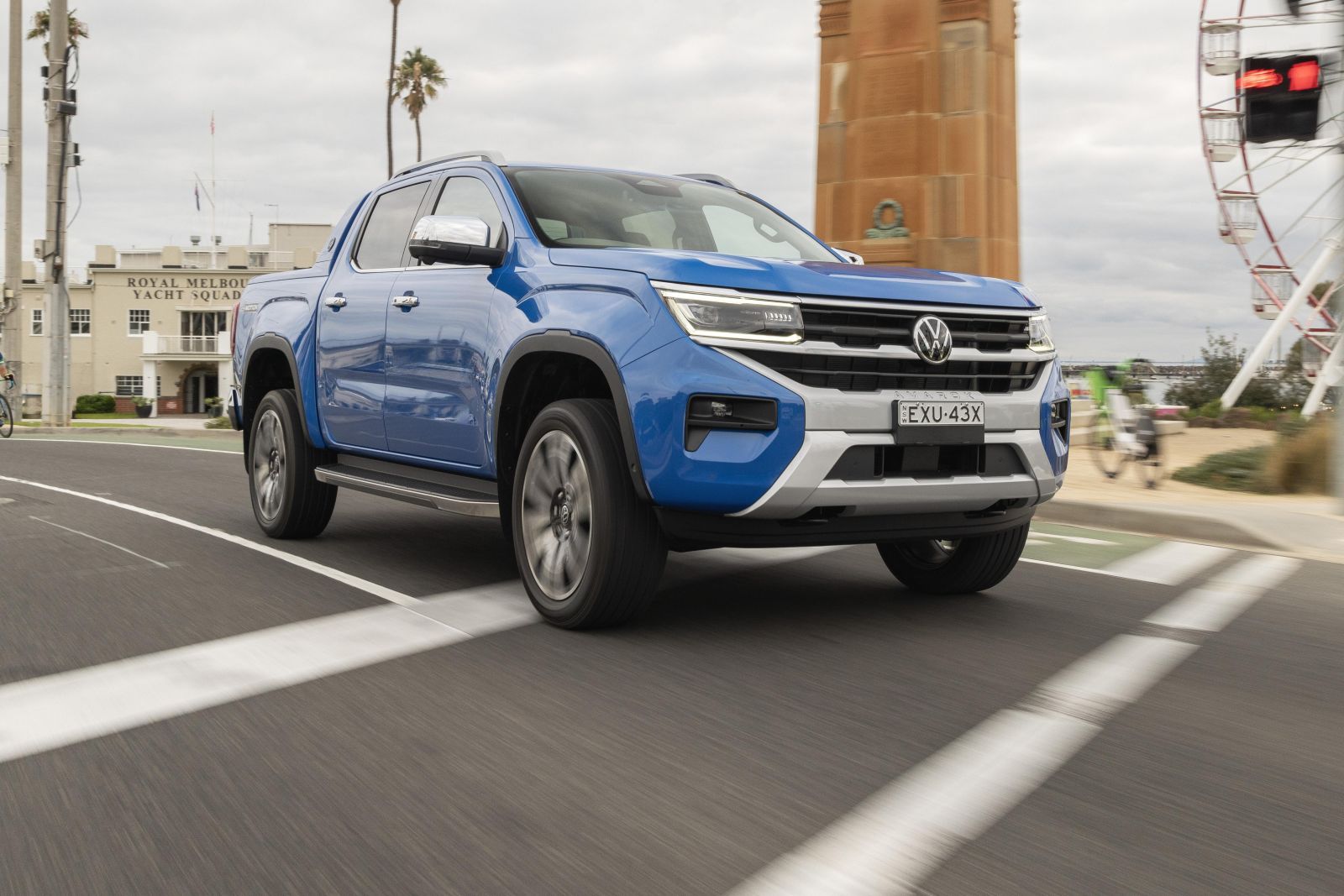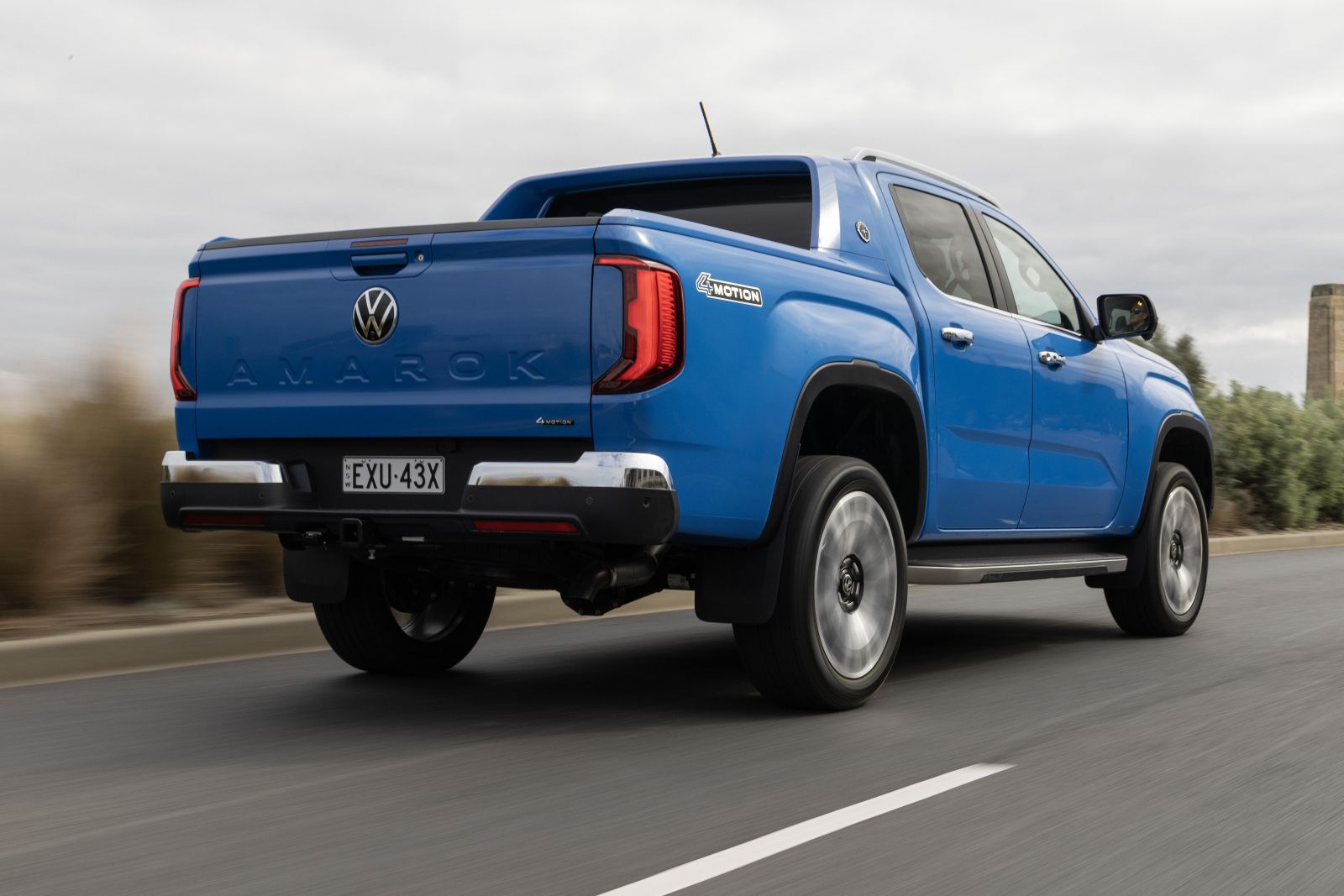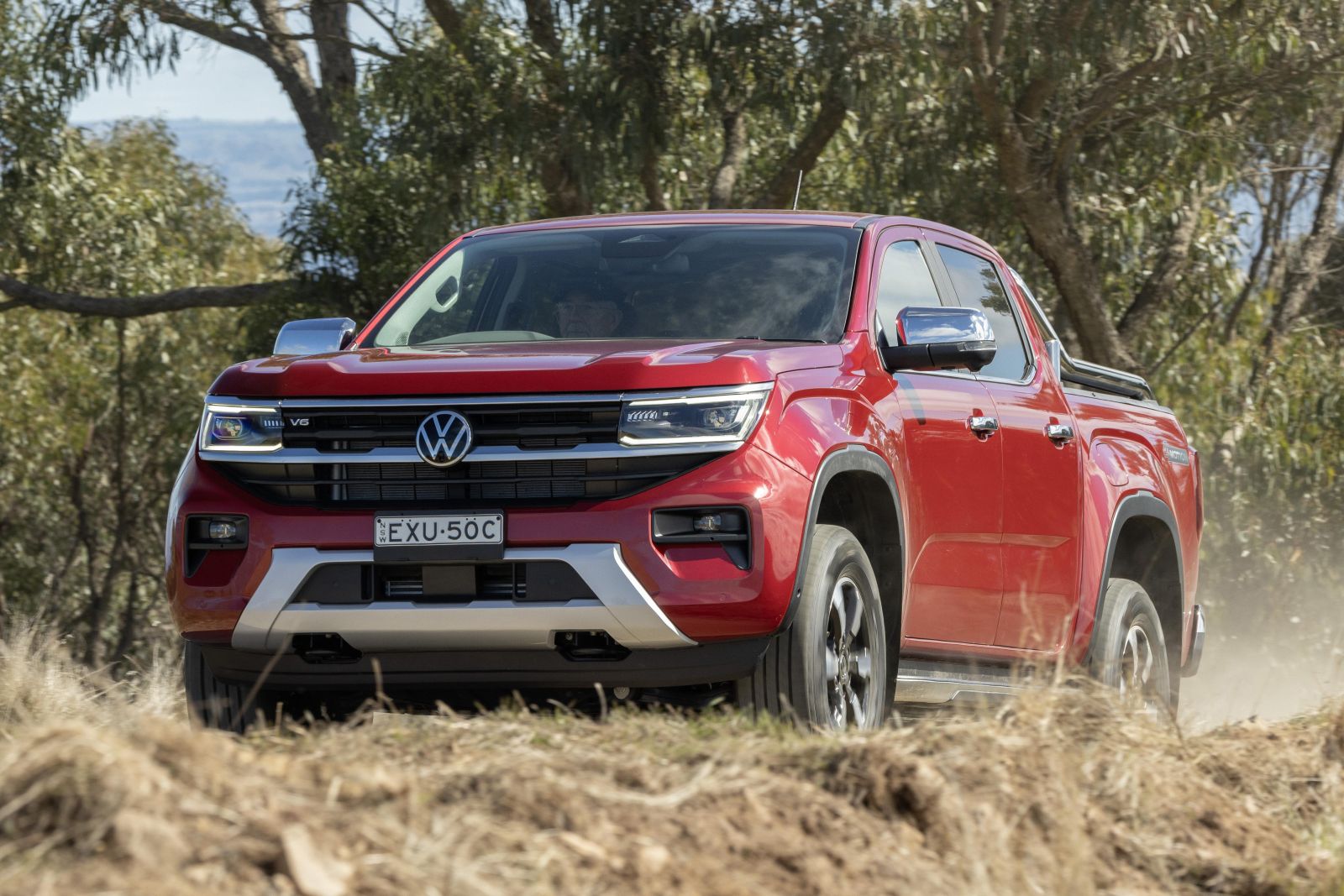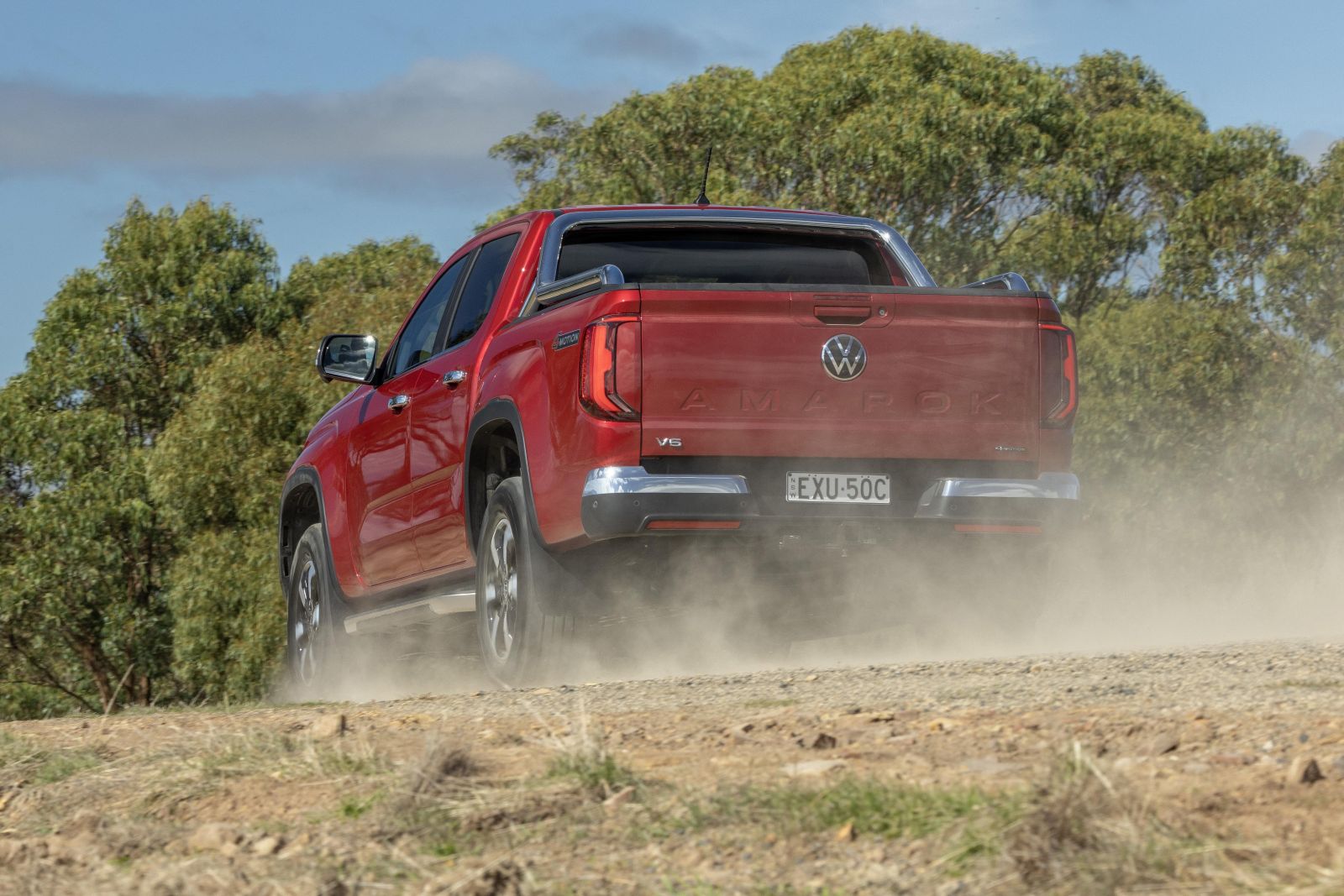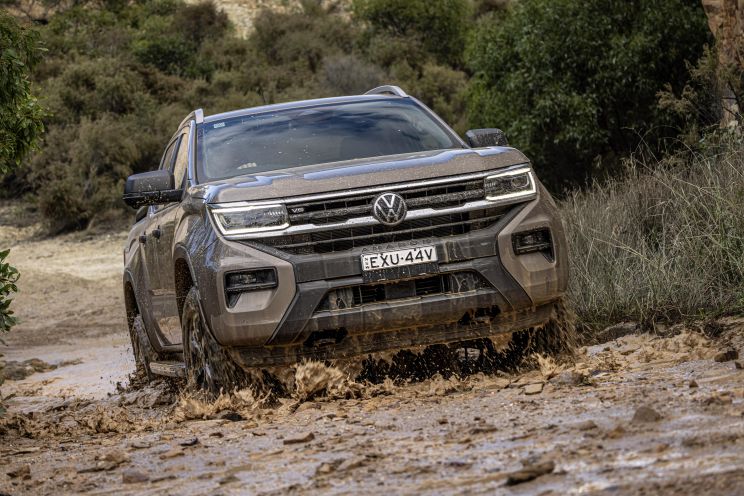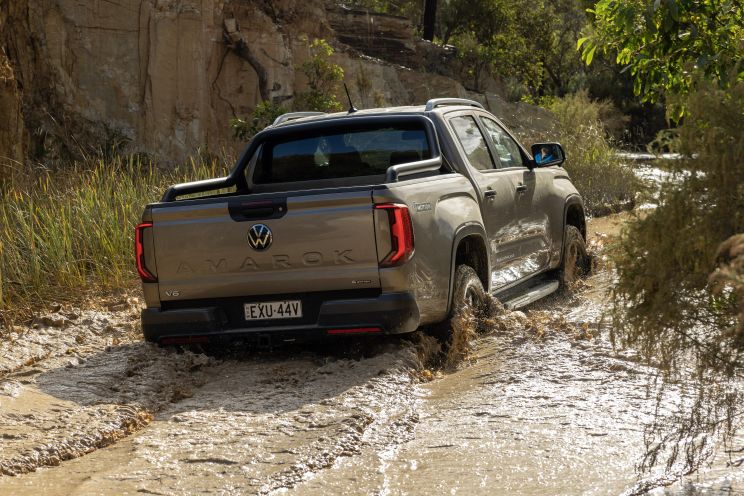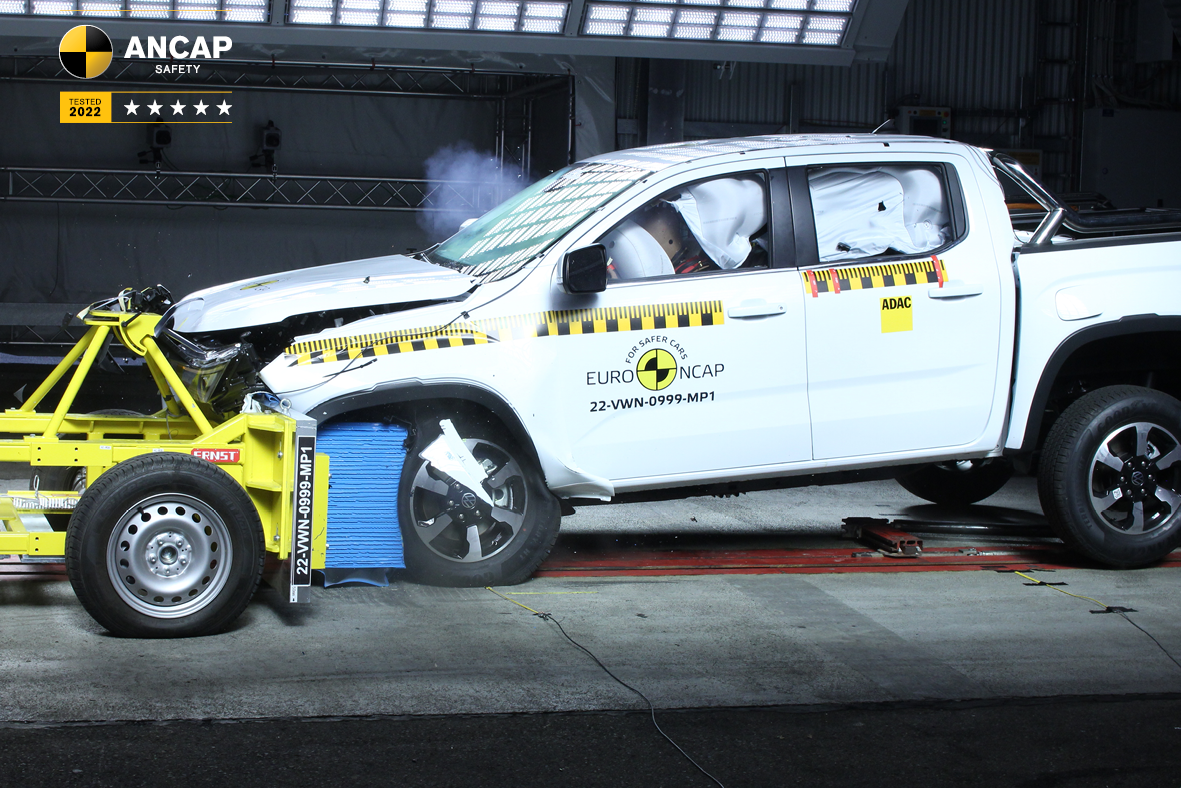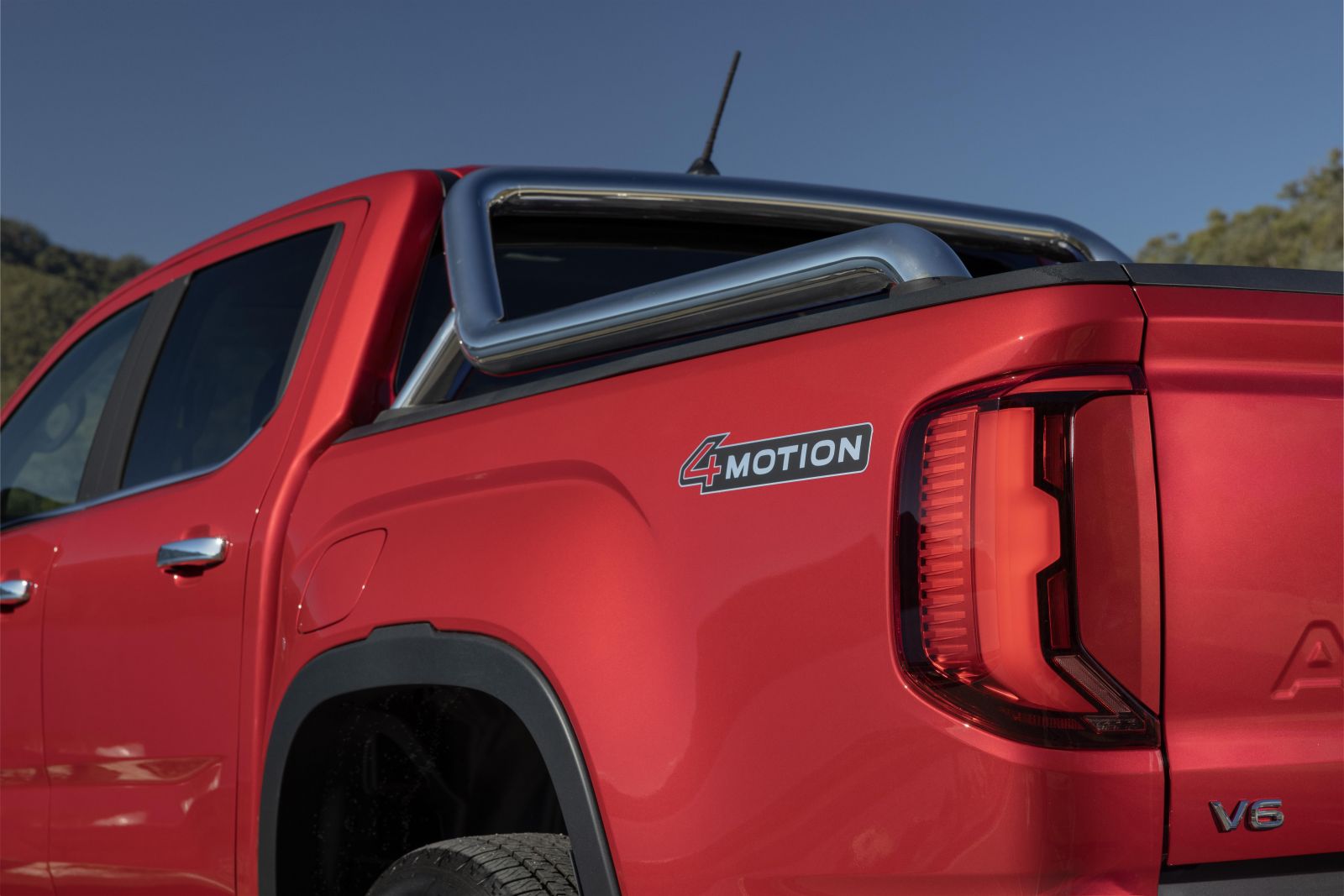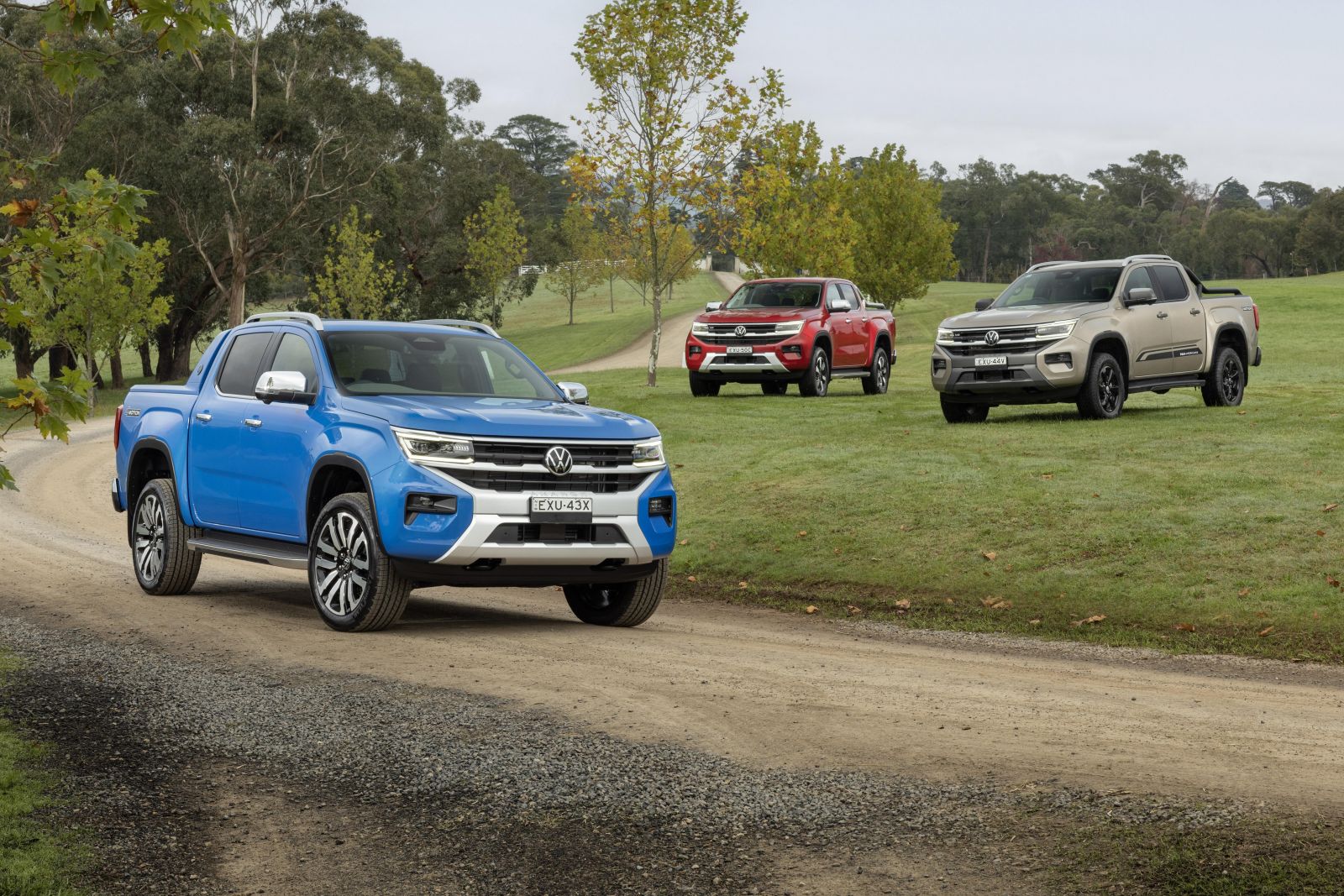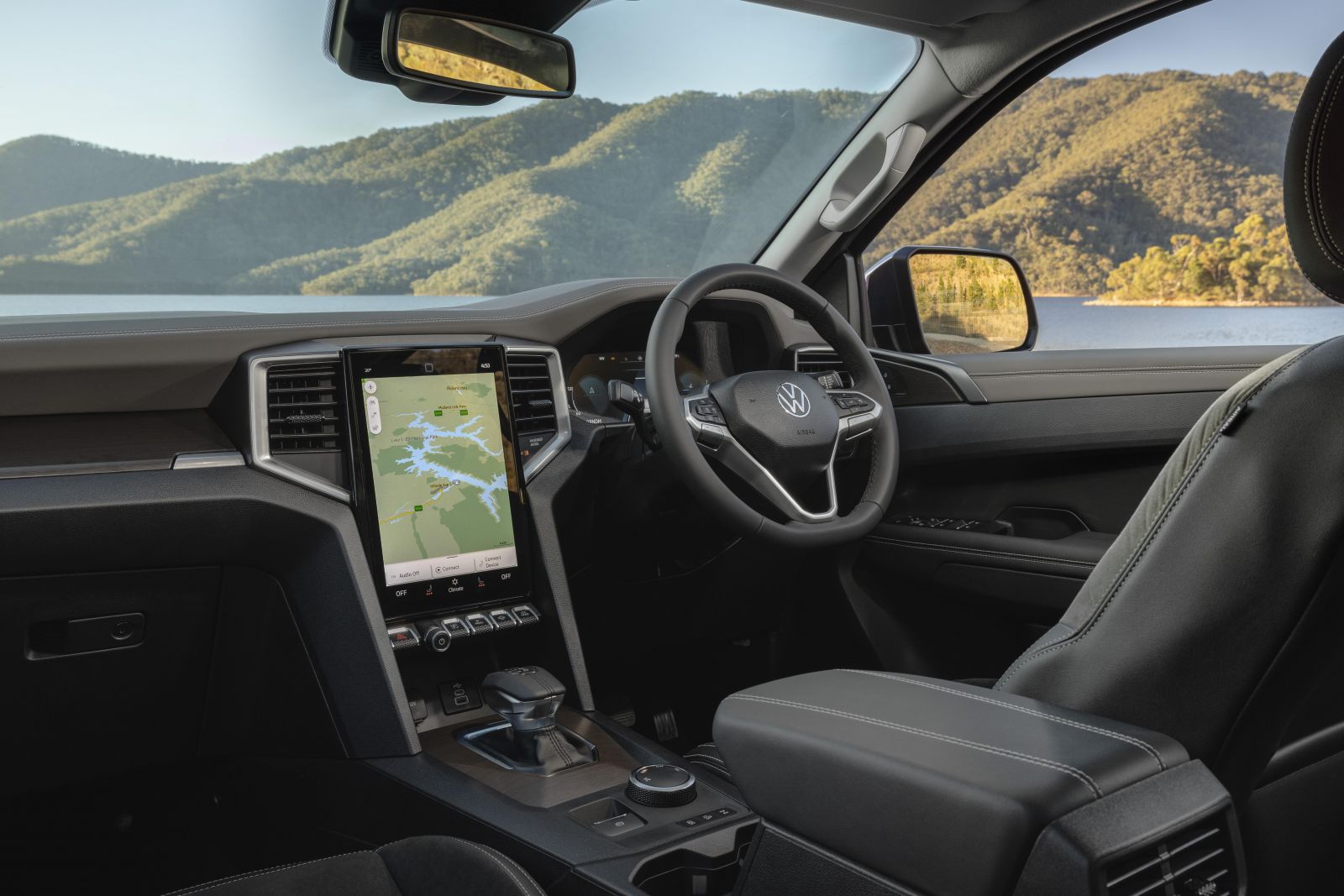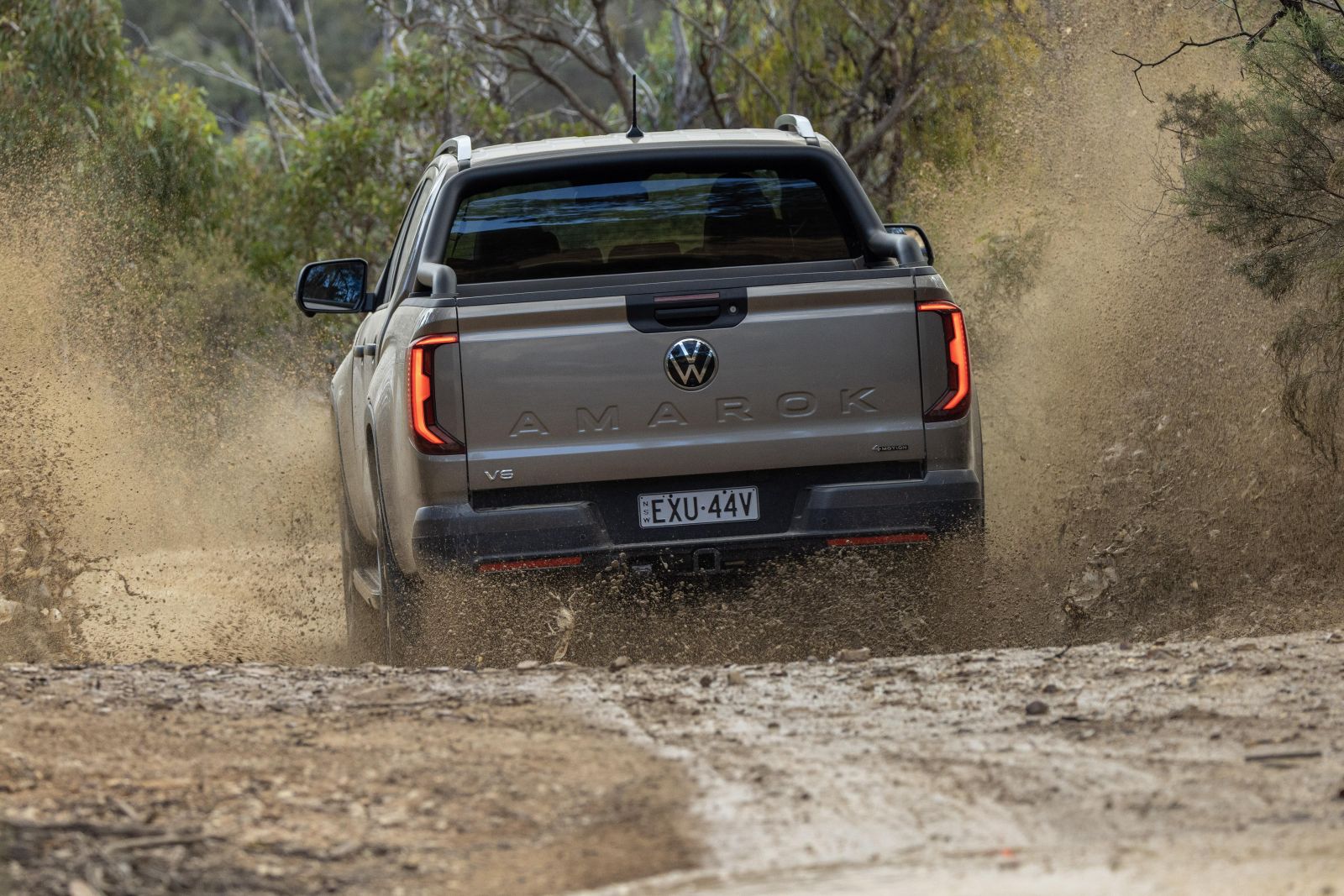It’s finally here, folks.
A whopping 12 years after the first-generation Amarok hit Australia, and nine months after the its reveal in Germany, the second-generation Volkswagen Amarok has hit local shores.
It touches down with plenty of pressure on its crisply-styled shoulders. Volkswagen is expecting it to be a best-seller in Australia, sitting alongside the T-Roc small SUV atop its sales charts, and it’ll be taking on the rampantly popular Ford Ranger and Toyota HiLux.
The Amarok is a very different beast to its predecessor. It’s been widely reported the car shares its underpinnings and engine with the latest Ford Ranger for starters, and the cabin features the sort of safety and infotainment technology that its predecessor couldn’t have even dreamed of.
The V6 turbo-diesel lives on, but it’s backed by a new twin-turbo four-cylinder diesel and a new 2.3-litre petrol engine that shares its bones with the Ford Focus RS and Mustang performance models.
That the new Amarok will represent a big step forward from its creaky predecessor is almost a given. But does it have what it takes to set itself apart from the all-conquering Ranger, and to take on the likes of the HiLux, Isuzu D-Max, and the Mazda BT-50?
How much does the Volkswagen Amarok cost?
The Amarok range kicks off just north of $50,000 before on-road costs, and extends to just shy of $80,000.
At the bottom end, the Amarok Core automatic is aligned with an almost-top-spec Mitsubishi Triton GLS 4×4, or an absolute base Ford Ranger XL – albeit one with the more powerful Bi-Turbo engine and a 10-speed automatic.
At the top end, the PanAmericana is a close match for the Ford Ranger Platinum on price, while the Aventura slots between the Platinum and Ranger Raptor based on its sticker.
2023 Volkswagen Amarok pricing:
- Volkswagen Amarok Core
- 2.0 TDI405 4Motion manual: $50,990
- 2.0 TDI405 4Motion six-speed auto: $52,990
- Volkswagen Amarok Life 2.0 TDI500 4Motion 10-speed auto: $56,990
- Volkswagen Amarok Style
- 2.0 TDI500 4Motion 10-speed auto: $66,990
- 3.0 TDI600 4Motion 10-speed auto: $70,990
- Volkswagen Amarok PanAmericana 3.0 TDI600 10-speed auto: $75,990
- Volkswagen Amarok Aventura
- 3.0 TDI600 4Motion 10-speed auto: $79,990
- 2.3 TSI452 4Motion 10-speed auto: $79,990
Prices exclude on-road costs
What is the Volkswagen Amarok like on the inside?
The new Amarok looks and feels like a Volkswagen behind the wheel.
There are some parts anyone who’s driven a Ranger will recognise, but the design, materials, and cabin technology are distinct. Even the mid-range Style feels quite premium, and the range-topping Amarok Aventura is a very nice place to spend time.
Volkswagen offers a range of finishes on offer to make unique variants feel… unique. The mid-range style feels like a quality item, the PanAmericana with its special stitching and rougher leather will appeal to outdoorsy types, and the range-topping Aventura is posh enough to justify its $80,000 price tag.
Most of the materials are nice to look at and touch, although the plastic trim pieces flowing from the dashboard into the transmission tunnel are pretty scratchy across the range. This is a commercial vehicle after all.
The fundamentals are good. The driving position is comfortable for long stints behind the wheel, regardless of which model you opt for, and most of what you need to poke or prod is within easy reach. The steering wheel extends out to meet taller drivers, and the touchscreen doesn’t require too much stretching.
Speaking of the infotainment, it’s mostly good. It starts fast, has crisp graphics and identifiable fonts, and has wireless phone mirroring – but falls into some of the traps afflicting other Volkswagen Group products.
There are no dials for the climate control, for example, so you need to take your eyes off the road and prod the screen at twice to change the temperature, and there are lots of sub-menus when you start diving into the driver assistance screens.
It’s not far off being excellent, but bigger icons and a smarter layout would be welcome in a few places. It’s also missing the handy front-facing camera that activates when you flick into one of the off-road modes.
Also missing is the app connectivity you get from the Ranger. Being able to test the indicators and lights on a trailer from the outside of the car using an app, for example, is very handy, as is the ability to control your zone lighting.
The digital instrument display is standout, however. It looks modern, and offer the right blend of information and legibility. The splashy graphics when you change drive modes add a hint of flair, and the fact no Ranger except the Raptor has the same full-sized digital dashboard as the Amarok is a tick for Volkswagen.
Storage spaces abound up front. There are cupholders on the transmission tunnel, a wireless phone charger under the dash, and a deep central bin – although the trailer brake controller does make it harder to put a phone in that charger, and means the USB-A and USB-C ports are recessed to the point of being hard to reach.
All of our testers featured a neat flip-top storage bin above the glovebox, complete with plastic ridges to stop objects sliding around.
As for the rear seats? They’re a meaningful improvement on what was on offer in the last Amarok, which Volkswagen says was a key priority when developing the second-generation car.
Legroom and headroom are improved, although they’re par for the class rather than standout.
The elevated rear bench will do wonders if your kids are prone to carsickness, and the inclusion of air vents will no doubt be welcome during hot Australian summers.
ISOFIX points feature on the outboard rear seats, and there’s a trio of top-tether points for child seats. There are no rear USB ports, however.
The tray still features space for a pallet between the arches, and has up to six tie-down points. Bare metal, a plastic tub liner, and a spray-in bed liner are offered depending on the model, and the range-topping Aventura has a powered roller cover that can be operated from the key.
The tailgate features a torsion bar, making it easier to open than it otherwise would’ve been.
What’s under the bonnet?
The entry TDI405 engine in the Amarok is a 2.0-litre single-turbo four-cylinder diesel making 125kW of power and 405Nm of torque.
It’s sent to the road through a six-speed manual or automatic transmission, along with a 4Motion four-wheel drive system with selectable 2H, 4H, and 4L modes.
The TDI500 has a bi-turbo 2.0-litre four-cylinder turbo diesel making 154kW of power and 500Nm of torque, mated with a 10-speed automatic transmission and selectable four-wheel drive.
The TDI600 packs a 3.0-litre turbocharged V6 diesel making 184kW of power and 600Nm of torque, mated with a 10-speed automatic and full-time four-wheel drive.
The only petrol option is the TSI452, which is a turbocharged 2.3-litre petrol engine making 222kW of power and 452Nm of torque. It’s mated with a 10-speed automatic and full-time four-wheel drive.
All models will have an 80L fuel tank, and TDI models now have a 19.3L AdBlue tank instead of the 6.3L unit on the outgoing car.
2023 Volkswagen Amarok engine specs:
| Model | Configuration | Outputs | Fuel | Consumption |
|---|---|---|---|---|
| Core TDI405 6MT | Single Turbo 2.0L four-cylinder | 125kW and 405Nm | Diesel | 7.1L/100km |
| Core TDI405 6AT | Single Turbo 2.0L four-cylinder | 125kW and 405Nm | Diesel | 8L/100km |
| Life TDI500 10AT | Bi-Turbo 2.0L four-cylinder | 154kW and 500Nm | Diesel | 7.2L/100km |
| Style TDI500 10AT | Bi-Turbo 2.0L four-cylinder | 154kW and 500Nm | Diesel | 7.2L/100km |
| Style TDI600 10AT | Single Turbo 3.0L V6 | 184kW and 600Nm | Diesel | 8.4L/100km |
| PanAmericana TDI600 10AT | Single Turbo 3.0L V6 | 184kW and 600Nm | Diesel | 8.4L/100km |
| Aventura TDI600 | Single Turbo 3.0L V6 | 184kW and 600Nm | Diesel | 8.4L/100km |
| Aventura TSI452 | Single Turbo 2.3L four-cylinder | 222kW and 453Nm | Petrol | 9.9L/100km |
How does the Volkswagen Amarok drive?
We spent most of our time behind the wheel of the V6 diesel, which Volkswagen expects to dominate sales.
Around 80 per cent of pre-orders have been for that engine, and even when early adopters have their cars and regular punters are laying down their hard-earned cash, the brand expects around 60 per cent of people to stump for the most powerful diesel.
As we know, it’s a good engine. It fires quietly, with very little diesel clatter or vibration from behind the wheel at idle, and it’s a smooth mover at low speeds thanks in no small part to the 10-speed automatic transmission.
It’s hard to know what gear you’re in at any given time because they’re stacked closely – and because for the most part you just get what you need, when you need it. The 600Nm torque peak hits at just 1750rpm, so it pulls nicely from low in the rev range, and it’s smooth and refined when you press harder.
The last Amarok had quite a heavy, direct steering rack. The new model has lighter steering that makes it quite wieldy at low speeds, despite having a longer wheelbase and body than the car it replaces, and the surround-view camera (on the Style and above) is welcome when you’re trying to park such a big beast.
The broader suite of active driver assists is welcome. Adaptive cruise control is smooth and smart, and the active lane-keeping assist is confident without feeling like it’s trying to wrestle the wheel from your hand. Combined with a quiet, refined cabin at highway speeds, the assists make the new Amarok a very capable cruiser.
There are two suspension tunes on offer. The first features twin-tube dampers, and is offered on the Core, Life, and Style, and the second is a tauter setup with monotube dampers offered on the PanAmericana and Aventura.
The Style is more relaxed on the open road, with more body roll in the corners, and more movement over crests.
You’re still aware it’s a commercial vehicle with no load in the back (no great surprise), but you don’t get the sense the tail is wagging the dog when you hit bumps at speed, and occupants aren’t jiggled relentlessly.
Swapping into the Aventura reveals a different character. It’s more tied down over bumps, with a taut-feeling body that places it somewhere between the previous-generation Amarok and its sportier W580S sibling, and you’re more aware of smaller bumps thanks to the standard 21-inch (!!) wheels.
Volkswagen has always pitched the Amarok as an ‘SUV with a tray’ rather than a work vehicle at the top end, and the Aventura delivers on that pitch – especially with the 2.3-litre turbocharged petrol engine.
It’s a bit different to what we’re used to in dual-cab utes, with no diesel clatter and a revvier character, but it plays into the almost-luxury-SUV feeling Volkswagen is chasing.
There’s plenty of torque on tap, so it doesn’t feel slow, and it’s a smooth mover towards the top end of the rev range. No, you don’t get a Focus RS-style bark, but the way it drives will feel immediately familiar to anyone hopping out of a Tiguan or Touareg.
It’s a shame Volkswagen hasn’t put paddles on the steering wheel, because it’d be a fun ute to push if you could keep it in the power band… if you didn’t have to use the stupid Ford buttons on the transmission selector.
Although it’s good to look at, the Aventura wouldn’t be my pick. That honour belongs to the PanAmericana, which has the same suspension tune but rides on 18-inch wheels wrapped in more off-road oriented tyres that take the edge off the ride.
It’s designed to be the most capable Amarok off-road, and dealt pretty effortlessly with everything we could throw at it.
As is the case in the Ranger, all the mode shifts are clearly communicated on the digital dashboard, and the preset Mud and Ruts or Sand modes make life easier for nervous off-roaders.
The fact you don’t have the same off-road camera system (the forward-facing camera locks out on the move) is a shame though, as it’s very helpful technology on tight trails and over blind crests.
Volkswagen points to the Amarok’s improved ground clearance (235mm), wading depth (800mm), approach and departure angles (30 and 25.6 degrees) as evidence of its off-road ability, and the ease with which it dispatched the off-road course we drove would suggest it’s every bit as good as its dual-cab rivals when the going gets tough.
What do you get?
Amarok Core highlights:
- Exterior
- 17-inch alloy wheels
- Electric folding mirrors
- LED headlights
- Tow bar with trailer brake controller
- Locking tailgate
- Mud flaps
- Cargo bed lighting and tie-downs
- Interior
- Fabric seats
- Vinyl floors
- Single-zone air-conditioning
- 10-inch portrait touchscreen
- Apple CarPlay and Android Auto
- Digital radio
- Wireless phone charging
Amarok Life adds:
- Exterior
- Body-colour bumpers, mirrors, door handles
- LED fog lights
- Heated side mirrors with puddle lamps
- Locking wheel nuts
- Remote locking tailgate
- Interior
- Unique seat trim
- 6-speaker stereo
- Privacy glass
- Leather-wrapped shifter, steering wheel
- Carpet flooring and mats
- Auto-dimming rear mirror
- Other
- Electronic park brake
- Front tow hooks
- Rain-sensing wipers
- Automatic headlights
Amarok Style adds:
- Exterior
- 18-inch alloy wheels
- Chrome rear bumper, steps
- Matrix LED headlights
- Tub liner
- Stainless steel sports bar
- Insulated windshield
- Keyless entry
- Interior
- ArtVelour seat trim
- Power driver’s seat
- Heated front seats
- 12-inch vertical touchscreen infotainment system
- 12-inch digital instrument cluster
- Dual-zone climate control
- Ambient lighting
- Other
- 360-degree camera
- Alarm system
- Hands-free park assist
Amarok PanAmericana adds:
- Exterior
- 18-inch alloy wheels
- All-terrain tyres
- Black bumpers, mirrors, door handles
- LED tail lights
- Black sports bar and steps
- Soft tonneau cover
- Roof rails
- Spray-in tub liner
- Interior
- Leather seats
- Leather-trimmed dash, doors
- 8-speaker sound system
- Black headliner
- Powered passenger seat
Amarok Aventura adds:
- Exterior
- 21-inch alloy wheels
- Chrome bumpers, mirror, handles
- Rear sailplane
- Electric roller cover
- Interior
- Leather seats (Savona)
- Leather-trimmed dashboard
Is the Volkswagen Amarok safe?
The Amarok has a five-star ANCAP safety rating based on testing carried out by Euro NCAP in 2023.
It scored 86 per cent for adult occupant protection, 93 per cent for child occupant protection, 74 per cent for vulnerable road user protection, and 83 per cent for safety assist.
The adult occupant protection score for the Amarok is technically higher than what the Ranger received, with the Ford receiving a score of 84 per cent. The Amarok fared better overall in whiplash protection.
Standard safety equipment includes:
- 7 airbags
- Autonomous emergency braking
- Adaptive cruise control
- Lane-keep assist
- Speed sign recognition
- Multi-collision braking
- Reversing camera
- Rear parking sensors
Amarok Life adds:
- Blind-spot monitor
- Front parking sensors
How much does the Volkswagen Amarok cost to run?
The Amarok is backed by a five-year, unlimited-kilometre warranty like the wider Volkswagen range.
Maintenance is required every 12 months or 15,000 kilometres.
Volkswagen has confirmed the Amarok will cost $1800 to service for five years or 75,000 kilometres with one of its prepaid Care Plans, undercutting the price of the equivalent package for a 2022 four-cylinder diesel by $200, and a 2022 turbo-diesel V6 by $400.
Those who don’t opt for a Care Plan on the new Amarok will pay $329 for the first, second, and fourth service, $414 for the third service, and $400 for the fifth – equivalent to the same price over five years, but paid for at the time of service rather than being bundled into the car’s purchase price.
CarExpert’s Take on the Volkswagen Amarok
The new Amarok improves on its predecessor in a number of key ways.
It’s bigger and more modern inside, finally features a competitive suite of active safety features, and drives with the polish you’d expect of a Volkswagen dual-cab ute developed alongside the existing standard-setter from Ford.
Throw in a handsome exterior design, sharp service pricing, and the fact Volkswagen anticipates solid supply, and the Amarok has the makings of a major player.
What stands in its way? It’s on the expensive end of the ute spectrum in Australia, even alongside the Ranger, and a bit more polish on the infotainment front wouldn’t go astray.
It’s also a shame some of the Ford’s smartest touches – the off-road camera and tray step – haven’t translated here.
Volkswagen is expecting the Amarok Style to be the best-seller, and there’s no doubt it represents a sweet spot in the range. But an optioned Style is knocking on PanAmericana money, and the latter is a sharp looker, with a spec sheet that smartly balances luxury and capability.
A comparison with the class leaders awaits.
Click the images for the full gallery


